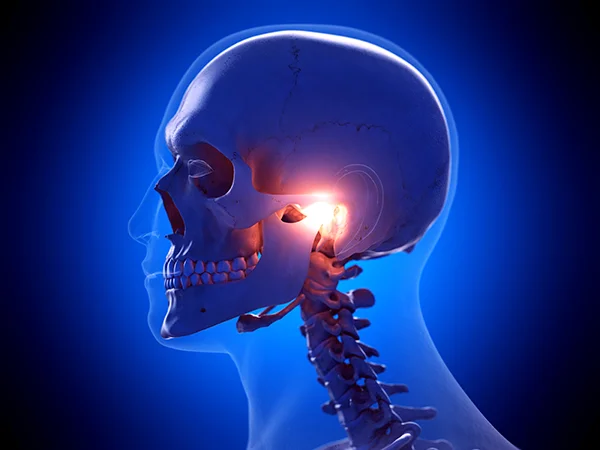Foods to Avoid When You Have a Tmj Disorder
Posted on 8/1/2024 by Mountain State Oral and Facial Surgery |
 The temporomandibular joint (TMJ) connects your jawbone to your skull. This complex joint allows you to perform essential functions like chewing, speaking, and yawning. When this joint becomes inflamed or injured, it leads to TMJ disorder, a condition that can cause pain, stiffness, and difficulty moving your jaw. The temporomandibular joint (TMJ) connects your jawbone to your skull. This complex joint allows you to perform essential functions like chewing, speaking, and yawning. When this joint becomes inflamed or injured, it leads to TMJ disorder, a condition that can cause pain, stiffness, and difficulty moving your jaw.
While the causes of TMJ disorder vary, certain lifestyle factors can worsen symptoms. One important aspect to consider is your diet. Avoiding specific foods can help manage your symptoms and promote jaw healing, ultimately reducing pain and discomfort.
Hard and Chewy Foods
Foods that require significant chewing force can exacerbate TMJ pain and inflammation. These include:
| • |
Tough meats: Steak, jerky, and other chewy meat products can put excessive strain on your jaw muscles and joints. |
| • |
Hard candy: Lollipops, caramels, and other hard candies require forceful biting and clenching, leading to jaw fatigue and discomfort. |
| • |
Chewy bread: Baguettes, bagels, and sourdough bread require substantial chewing effort, potentially aggravating your TMJ symptoms. |
| • |
Raw vegetables: Carrots, celery, and other raw vegetables can be tough and fibrous, making them difficult to chew and potentially irritating your jaw joint. |
| • |
Nuts and seeds: Almonds, cashews, and other nuts and seeds require significant jaw movement to crack and chew, potentially worsening pain and inflammation. |
Sticky and Gummy Foods
Sticky foods can adhere to your teeth and increase jaw clenching as you try to remove them. This can put unnecessary strain on your TMJ joint. Examples include:
| • |
Gummy candies: Avoid gummy bears, Starbursts, and other sticky candies that cling to your teeth and require forceful chewing. |
| • |
Dried fruit: While nutritious, dried fruits like raisins and cranberries become sticky when chewed, potentially irritating your jaw joint. |
| • |
Caramel and toffee: These sticky sweets adhere firmly to your teeth and necessitate prolonged and forceful chewing, exacerbating TMJ symptoms. |
Acidic Foods and Drinks
Acidic foods and drinks can worsen inflammation and discomfort in the mouth, potentially impacting the TMJ joint indirectly. Reducing your intake of the following items is recommended:
| • |
Citrus fruits: Lemons, oranges, grapefruit, and other citrus fruits contain high acidity, which can irritate the mouth and worsen TMJ discomfort. |
| • |
Tomatoes: While technically a fruit, tomatoes are highly acidic and can contribute to inflammation in the mouth. |
| • |
Pickles: The vinegar used in pickling makes them highly acidic, potentially exacerbating pain and irritation. |
| • |
Carbonated drinks: Sodas and other fizzy drinks contain citric acid and phosphoric acid, which can erode tooth enamel and irritate the mouth. |
Additional Tips for TMJ Management
In addition to dietary modifications, consider these tips to further manage your TMJ symptoms:
| • |
Apply ice or heat packs: Apply ice packs for 15-20 minutes at a time to reduce inflammation, or use warm compresses to relax your jaw muscles. |
| • |
Use over-the-counter pain relievers: Nonsteroidal anti-inflammatory drugs (NSAIDs) such as ibuprofen or naproxen can help manage pain and inflammation. |
| • |
Practice relaxation techniques: Engage in stress-relieving activities like meditation, deep breathing, or yoga to help manage jaw clenching and promote overall well-being. |
| • |
Limit jaw movements: Avoid wide yawns, excessive gum chewing, and prolonged singing or speaking to minimize jaw joint stress. |
If your TMJ symptoms persist or worsen, consulting your dentist or oral surgeon is crucial. They can advise on appropriate treatment options, which may include oral splints, physical therapy, or other interventions tailored to your individual needs.
By following these dietary recommendations and other management tips, you can effectively control your TMJ symptoms and improve your quality of life. Remember, maintaining good oral hygiene, practicing regular self-care, and seeking professional guidance when needed are crucial for optimal oral health and overall well-being.
|
|